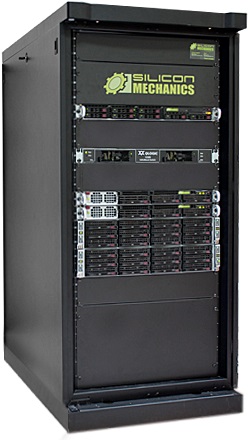Silicon Mechanics, Inc. announces that Tufts University, Medford, MA, is the winner of a complete high-performance computer cluster donated by Silicon Mechanics and its vendor partners as part of its second annual Research Cluster Grant competition. Tufts will use the cluster as a key component of an exciting, multidisciplinary effort to transform the way biological pattern formation is investigated. Their long-term mission is to integrate computer science, molecular biology, and biophysics to understand the processing of patterning information in living systems.
The competition was open to all U.S. and Canadian qualified post-secondary institutions, university-affiliated research institutions, non-profit research institutions, and researchers at federal labs with university affiliations. The applications were reviewed and rated based on criteria that included the proposal’s research goals, collaboration with other institutions or departments, student access to the cluster, and the importance of CPU and GPU technologies in the research.

The high-performance computing cluster rack from Silicon Mechanics.
The high-performance computing cluster, valued at about $78,000, is composed of the latest technology by Silicon Mechanics and its partners NVIDIA, AMD, Kingston Technology, Mellanox, Supermicro, Seagate, and Bright Computing. Equipped with NVIDIA M2090 GPUs and AMD Opteron 6300 series processors, the HPC cluster contains a head node, eight compute nodes, two GPU nodes, and both gigabit and InfiniBand networking.
The Tufts research, conducted in collaboration with the biology, computer science, biomedical engineering, and mathematics departments, and the Universidad de Sevilla, Seville, Spain, is developing the world’s first automated platform for the systematic discovery of emergent patterning properties from real biological data.
“The interdisciplinary group will use the cluster to develop a new kind of bioinformatics that integrates functional genetic data into a true systems-level understanding of the remarkable mechanisms that enable living beings to build, control, and dynamically repair their bodies,” said Tufts biology professor Dr. Michael Levin. “Running the simulation environment we envisage requires a very high computational cost, which means the project will greatly benefit by the high-performance computer cluster awarded in this grant.”
Art Mann, Silicon Mechanics’ education/research/government vertical group manager, notes that the Tufts proposal really takes advantage of the latest state-of-the-art hardware and software included in this year’s cluster. “We are excited by the extremely high caliber of applicants responding to this unique grant opportunity, and thrilled to play a role in furthering Tufts’ cutting-edge research.”
Advertisement
Learn more about Silicon Mechanics





